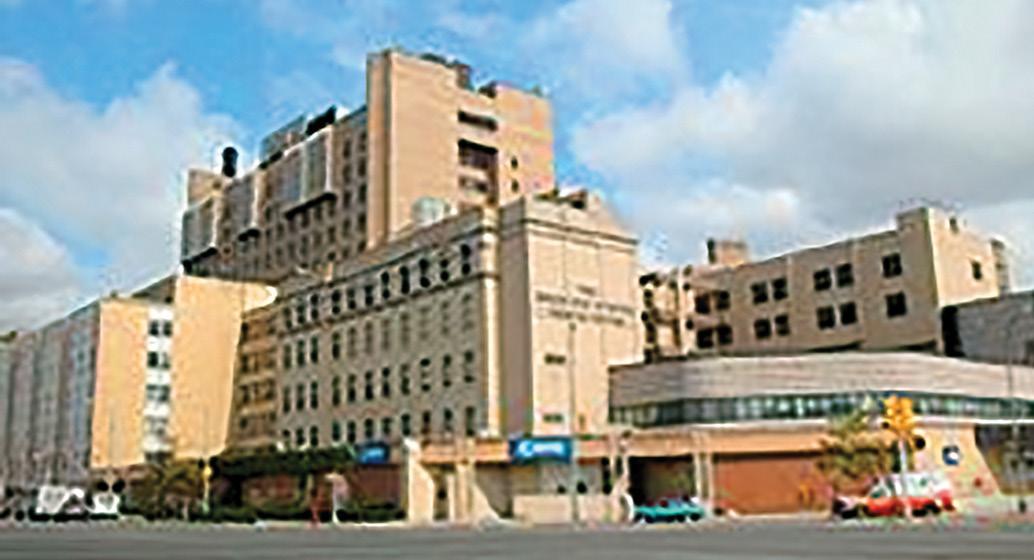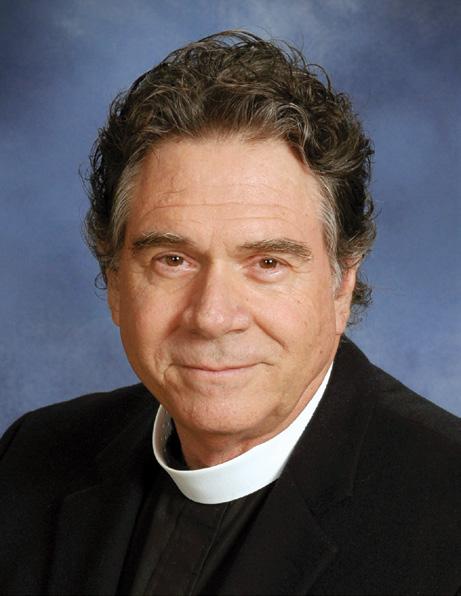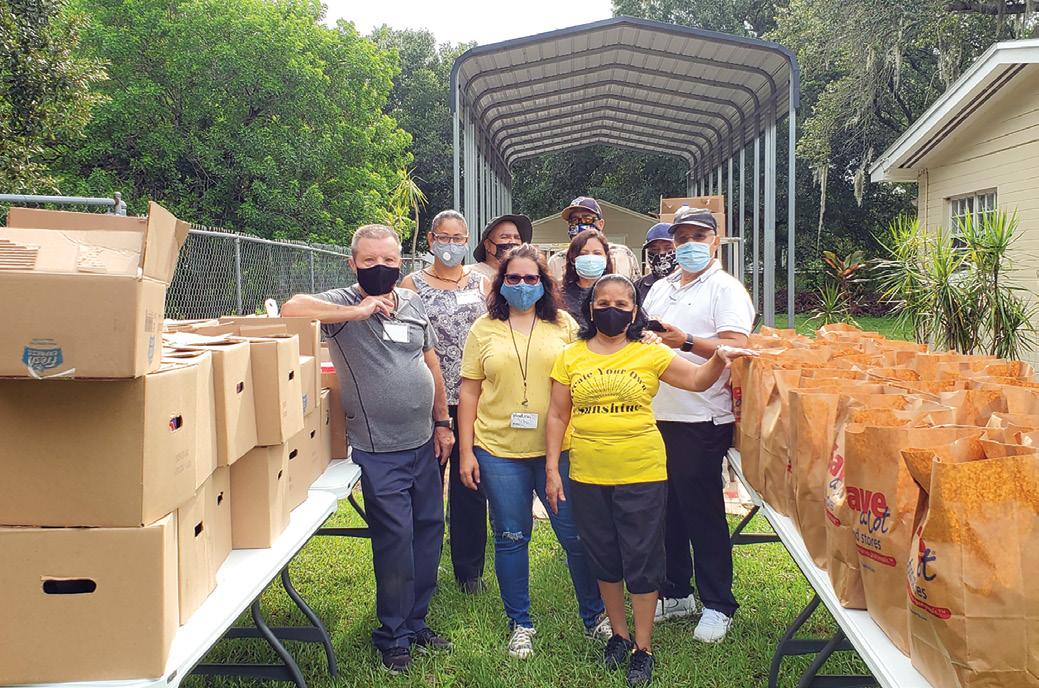
11 minute read
Struggle in Honduras Nears Catastrophic Proportions
By Jolene Taracatac
Advertisement
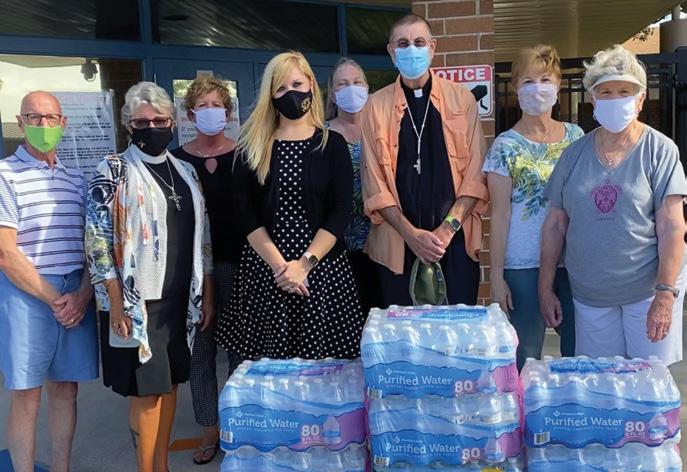
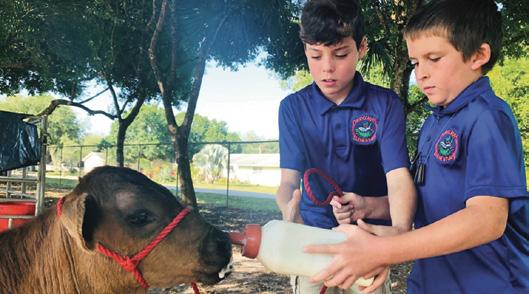
Back to school looks different in many Clergy and parishioners of Church of Our Saviour pose with ways this year due Everglades Elementary School project banner. to COVID-19. Not only has the pandemic affected the way classes are conducted for teachers and students, but it has also impacted outreach efforts for some diocesan churches. However, that didn’t stop Church of Our Saviour Everglades Elementary students participate in the school’s agricultural program. in Okeechobee. Instead, the church got creative in rethinkMembers of the clergy and vestry make their first delivery of donated water to ing its outreach to schools. Everglades Elementary. (L-R: Jim Lucas, senior warden; The Rev. Kay Mueller, For years, Church of Our deacon; Melanie Stinnett, COOS parishioner and Everglades Elementary guidance counselor; Jenni Ellis, Everglades Elementary principal; Linda Myers, COOS Vestry; Saviour hosted a luncheon at The Rev. Jim Shevlin, rector; Debby Duncan and Peggy Harlow, COOS Vestry.) the beginning of each school year to welcome new teachers and administrators of she was overwhelmed with gratitude,” The Rev. the Okeechobee County School District. The church Kay Mueller, deacon for Church of Our Saviour, served a lovely plated lunch and provided teachers recalls. with school supplies for their classrooms. Unfortunately, this year’s restrictions on gatherings challenged the church to come up with a new idea. Church of Our Saviour has appointed three members of the vestry to oversee this project. Peggy Harlow, who was part of Okeechobee’s After some brainstorming, the vestry decided to adopt education system for 42 years, including a school on which the church could have the most imseveral years as a teacher and 20 as an adminpact. Everglades Elementary made a great candidate istrator, heads the project. The three vestry since 94-98% of its students live at the poverty level in members will continually assess the school’s a total enrollment of 492. The vestry made a commitneeds throughout the year. Right now, they are ment to adopt the school for the entire 2020-2021 collecting small individual packages of tissues, academic year. pencils, dry-erase markers, plastic or paper cups, Everglades Elementary is also unique since it was the and small bottles of water since the use of water first school in South Florida to implement an agriculfountains is not permitted. In addition, they tural program at the elementary education level. Not are accepting clothing donations so younger only do the students learn academic subjects, but they students can have access to a change of clothes also learn responsibility and sustainability. Since the during school days. school’s agricultural program began, other Florida “The list of ways the vestry is planning to help schools have used it as a model. Everglades Elementary is continually growing,” After the decision to adopt the school was made, the said Mueller. “For instance, we plan to assist the vestry spoke with Melanie Stinnett, guidance counselschool’s families during holidays with things or at Everglades Elementary and longtime parishiolike preparing Thanksgiving baskets. Our goal ner of Church of Our Saviour, about the adoption. She is to do everything we can to help Everglades will act as liaison, communicating the school’s needs Elementary have a successful, safe and blessed to the church. “When we shared the news with her, school year despite COVID-19.”
BENEFITING CHILDREN
Who Learn Differently
Holy Trinity Episcopal Church in Fruitland Parkis holding its sixth annual golf tournament to benefit its school for children who learn differently. Blackston Financial Advisory Group will be the tournament’s title sponsor for the third year in a row. The fundraiser is being held at
Harbor Hills Country Club 6538 Lake Griffin Road, Lady Lake, FL Oct. 30 - 31, 2020
Tournament’s website: www.HTECgolf.com Holy Trinity Episcopal School is a ministry of the church in Fruitland Park, near The Villages. It offers faith-based education programs for students in grades 6 through 12, with various degrees of learning challenges. The school offers specialized curriculums aligned with individual needs and with a low student-to-teacher ratio. Many of the students come from economically challenged families, so the school relies on community support to help with tuition. This year, due to the spread of COVID-19, the format of the tournament has been modified. In compliance with CDC guidelines on large gatherings, there will be individual tee times, one golf cart per player, and the tournament will be played over two days. Presently, Harbor Hills does not offer a buffet lunch, but instead, a box lunch. REGISTER NOW to play with NO payment due until Sept. 30, 2020. Or sponsor a hole with your name on a sponsorship sign on one of the holes. Or make a donation of $35, $50, $75 or whatever you are comfortable with. Your generosity will go a long way to helping students with scholarships. Checks should be payable to Holy Trinity Golf Tournament, c/o Holy Trinity Episcopal Church, 2201 Spring Lake Rd., Fruitland Park, FL 34731. If you’re not playing, we hope you will find it in your heart to send in a donation. Without your support, many of our students would not have had the opportunities to experience the productive lives they now have.
If you have any questions, please feel free to contact
Sidney Yee, 703-966-2615, sidney1949yee@gmail.com or Gay Hensley, 501-256-7858, gay.hensley1@gmail.com
PEOPLE & EVENTS Struggle in Honduras Nears Catastrophic Proportions
For more than five months, Honduras was locked down during the worldwide pandemic. Here in Central America’s second-poorest country according to the 2020 Index of Economic Freedom, the loss of life and business has been catastrophic. And the Diocese of Honduras has not escaped the devastating effects of COVID-19 either. Already struggling to meet financial needs despite help from multiple sources, the Honduran diocese took another hit in August, when the government announced that schools will not reopen until early 2021. Private schools will reopen online only, followed by public systems in February, and according to Bishop Lloyd Allen, “only a few will have access revenue. Many students live in rural areas and to the system.” He also will be unable to attend online classes because projected that 65-70% the families cannot afford computers or do not of students in the public have access to an internet provider. schools will lose their entire school year. Allen, in a letter to the Diocese of Central Florida, cited two families who have suffered the loss of By mid-August, enrolljobs, including one that closed down the family ment for the Holy Spirit business. All told, more than 500,000 have lost Episcopal schools was their jobs in a country of just over 9 million people. “very low.” This hurts the diocese as the schools are its primary source of Despite the financial woes, Allen has not been deterred in his desire to help those in need. At the beginning of the pandemic, he wrote appeal letters to bishop and clergy friends and companion diocese requesting support. So far, the Diocese of Central Florida has sent more than $65,000 to Honduras. Others have contributed as well, including the Diocese of Dallas, The Episcopal Church and individuals.
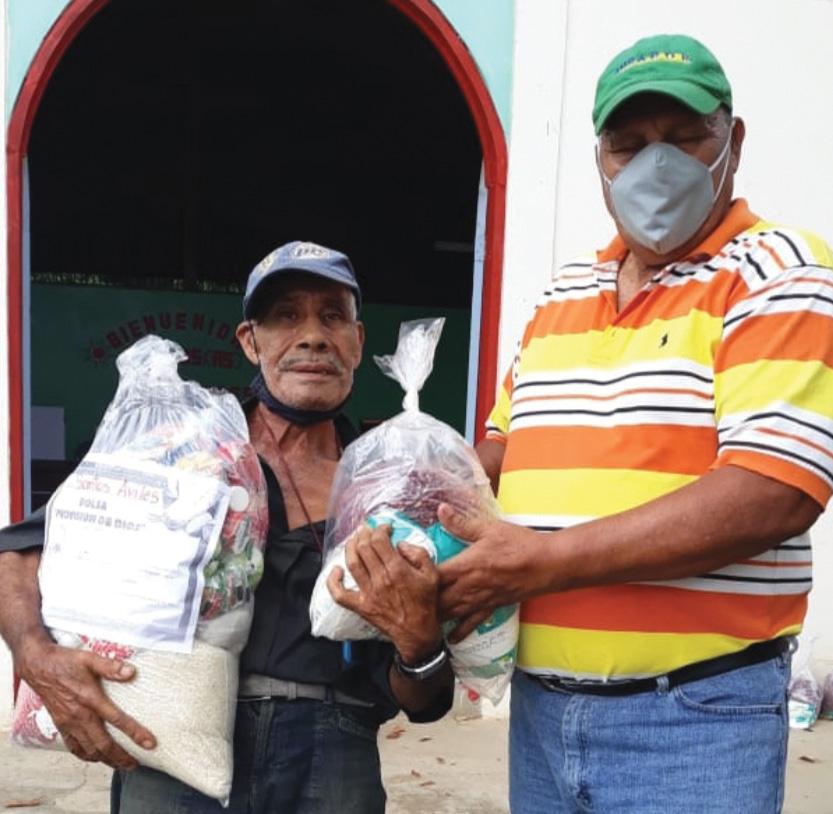
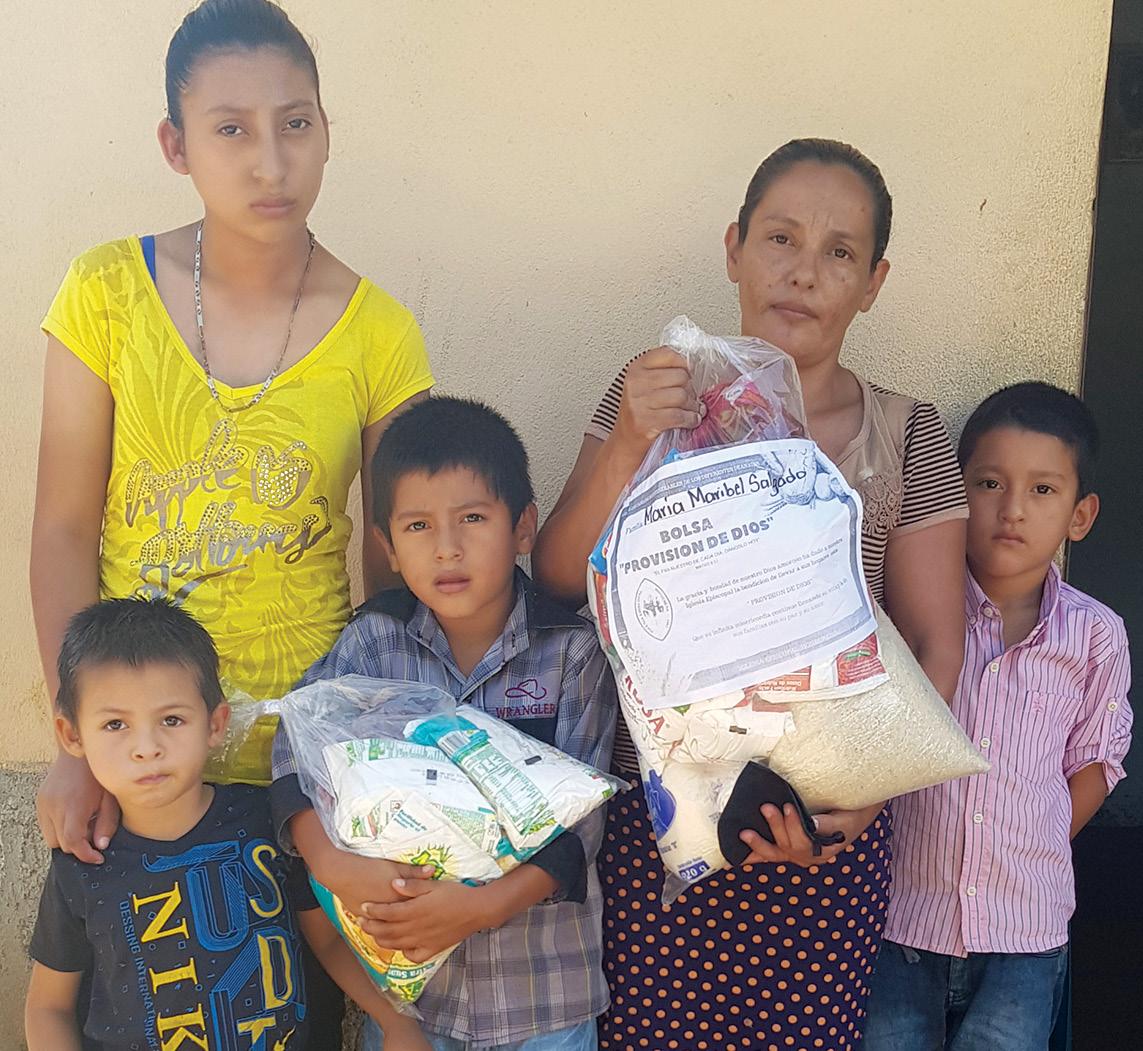
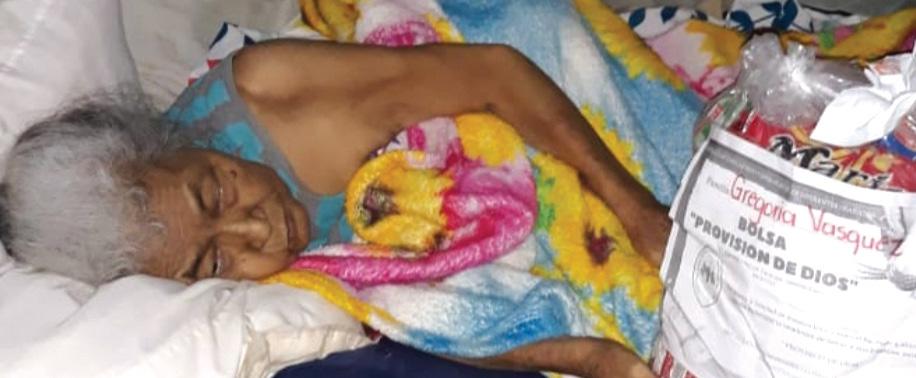
Along with the clergy stipend being set through September, the monies have provided food to more than 2,500 families, both Episcopalians and non-Episcopalians. After being shut down for five months, the country started reopening in mid-August, much to the dismay of many. Some, according to Allen, think the reopening came too soon, especially with the hospital system about to collapse because of COVID-19. But like most in the world, people are anxious to get back to normal life as soon as they can. During the shutdown, Hondurans were permitted to leave their homes twice a month or every 15 days according to the last digit of a person’s ID. If a person was caught on the streets without a rightof-passage permit, their vehicle was confiscated, and they were taken to prison for a couple of days, being forced to pay a fine before release. Time will tell whether the country was opened too soon or not. In the meantime, money is still an issue for the Diocese of Honduras. The monthly budget remains at $34,000 and the reserves have been depleted since June 1. Private donations and contributions from other dioceses will be Honduras’ only source of income for the foreseeable future until the schools reopen and enrollment increases.
Anyone wishing to help the Diocese of Honduras get through this difficult time can donate by texting: “DCF Honduras” (Leave a space between “DCF” and “Honduras.”) to “73256” to donate via credit/debit card or bank account.
Diocese Adapts to Ministry via Technology
By Marti Pieper
COVID-19 may have changed many things about the way the Diocese of Central Florida does church, but it hasn’t meant the cessation of ministry. Some of the shifts, such as social distancing and fewer in-person services, have meant more outreach opportunities and multiplied ways to reach people with the gospel of Christ. Even early in the crisis, The Rev. Jonathan French of Grace Episcopal, Ocala, saw that the pandemic had moved his congregation into new ways of connecting. “It exposed some areas that we had not really thought through,” he said. “And we are now thinking in a better way, particularly about things like Facebook, which … has become rather essential in this moment. And so I am learning to make use of it. Things like Zoom Bible studies are not only essential right now; they’re good. I thought they would be terrible, and they’re not. The ability to see people and to interact with folks that way really has worked out quite well.” Now several months into the pandemic, Grace has found more uses for technology. Not only does the church offer socially distanced in-person services following careful guidelines, but it also streams worship services, promotional videos for Sunday-morning services and children’s Bible stories as well as morning and evening prayer led by The Rev. Caroline Osborne and her husband, The Rev. Robert Osborne, on its Facebook page. But French said a key factor that has helped Grace stay in touch is something the church already had in place: an email database used to “communicate with our membership on a very regular basis” via Constant Contact newsletters on topics ranging from church activities to resources and ways the church can help. “I would say a key thing for us has been regular and consistent communication,” he said. Of course Grace, Ocala, is not the only church that has adapted to livestreaming. Numerous churches offer Zoom Bible studies or small groups in addition to livestreamed services. Check your church website or Facebook page for details. A recent Zoom seminar by The Rev. Rob Goodridge of St. Gabriel’s, Titusville, on the topic of enhancing online ministry (see
Goodridge “Best Practices for Church Streaming Shared,” p. 16) had 50 people in attendance and continues to be viewed online (find it at www.bit.ly/34V92aP). A follow-up to this training was held on Aug. 26. Reaching people with the gospel, of course, is the reason The Diocese of Central Florida exists and why it continues to grow and add new priests and deacons. To that end, the diocese has celebrated the recent ordination of two priests
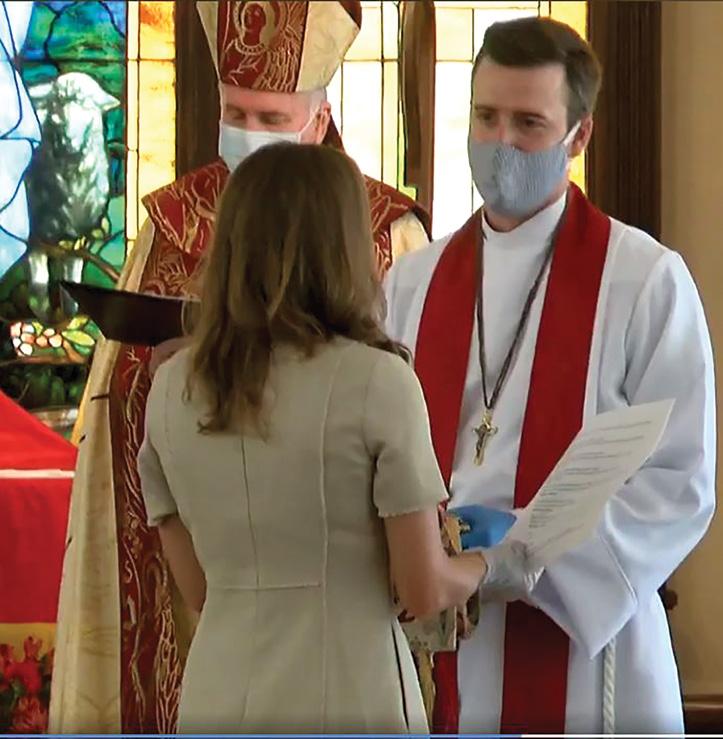
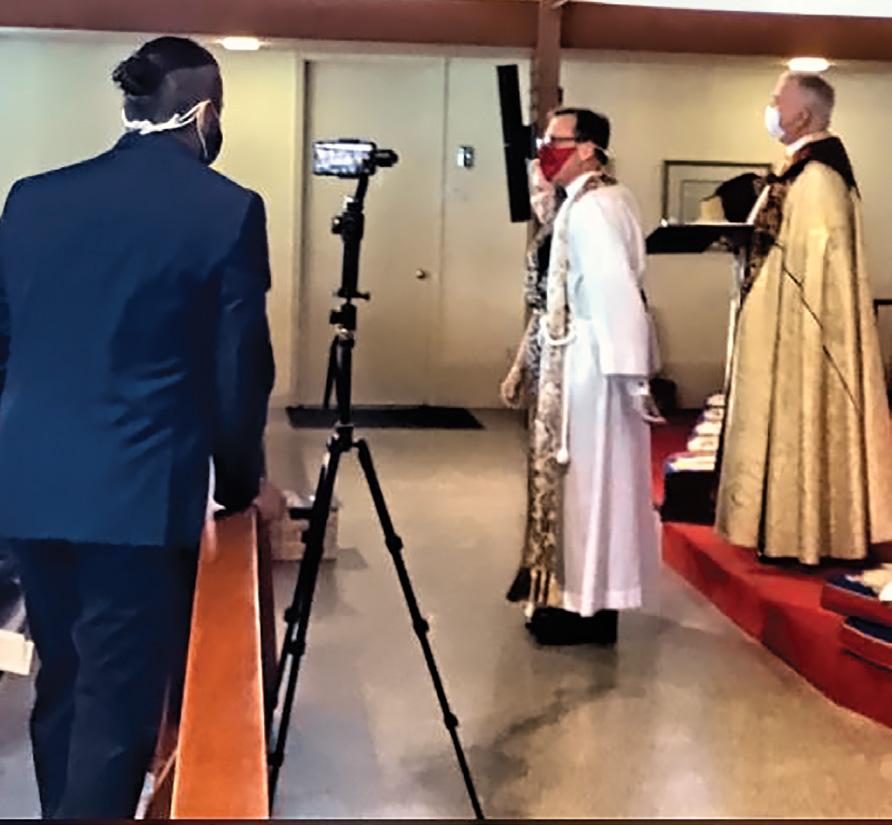
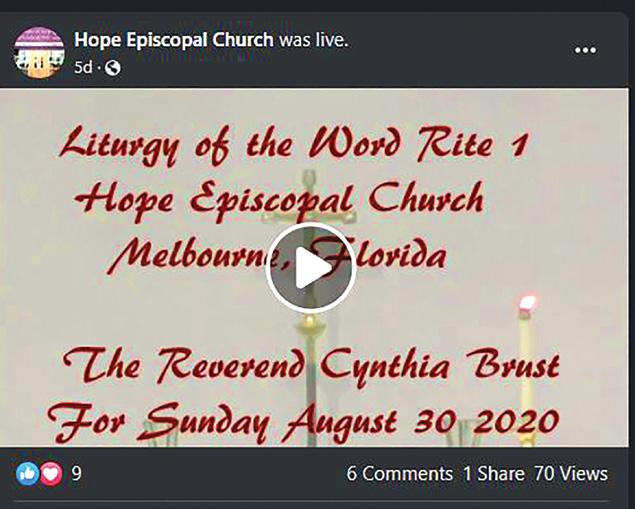
and celebrated the ministry of three others. The Rev. Peter Tepper, Cathedral Church of St. Luke, Orlando, was ordained to the priesthood in a livestreamed service on June 20, and The Rev. Daniel Pinell, Grace, Ocala, was also ordained as a priest in a livestreamed service on Aug. 22. Recent celebrations of new ministry included The Rev. Cynthia Brust, Hope, Melbourne, on July 12; her husband, The Rev. Ellis Brust, St. Andrew’s, Ft. Pierce, on July 19; and their son-in-law, The Rev. Porter Taylor, St. David’s by-the-Sea, Cocoa Beach, in a livestreamed service on Aug. 30. “It was such a blessing to be instituted as rector of St. David’s with Bishop Brewer, parishioners in person and the rest of our parish watching online,” said Taylor. “Our livestream has been the primary connection point with our locals and
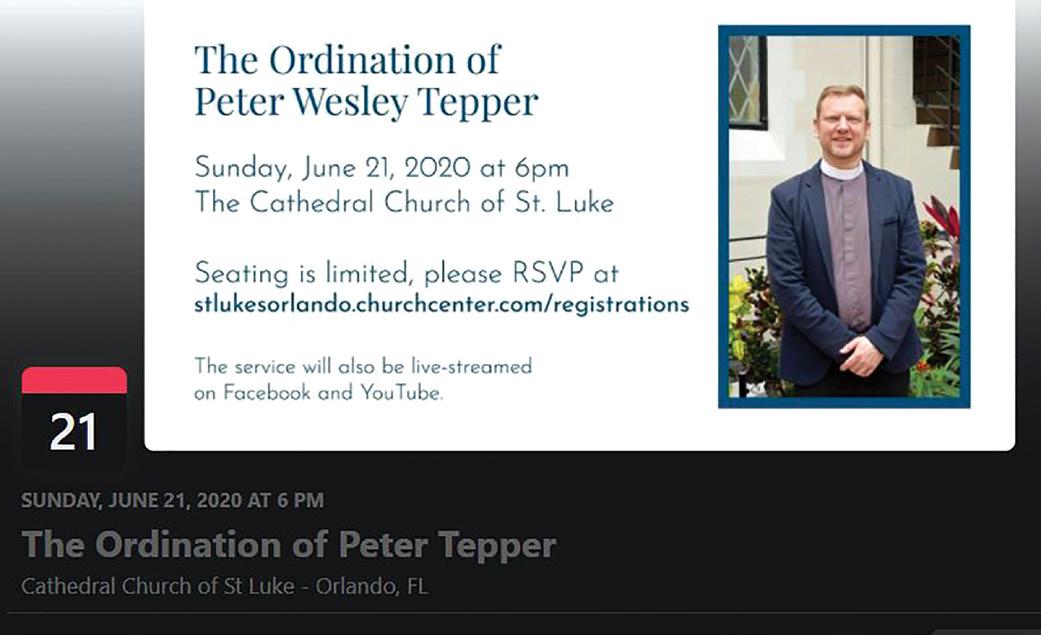
snowbirds over the past six months. Regardless of when we go back to in-person worship, the livestream will remain a central focus point of our Sunday worship because it allows us to connect with the whole body. The church worldwide had to adapt quickly when the pandemic started, but we now have an opportunity to adapt wisely and effectively moving foward. I am excited by this calling!” On Sept. 12, the diocesan ordination of new deacons took place at Cathedral Church of St. Luke, Orlando, and the service was livestreamed and may be viewed at this link: www.bit.ly/3hWHtBm.

